Rainstorms are often powerful here. They are also sources of free water. Water comes from many different sources, and for refugees on the camp, it’s not something taken for granted; they don’t have a right to it – it’s (usually) not free, it’s not usually flowing (and if it is – you sure don’t want to drink
 it and you probably should be careful about walking in it – and it might be best to avoid smelling it, if possible). Water is, for the most part, business.
it and you probably should be careful about walking in it – and it might be best to avoid smelling it, if possible). Water is, for the most part, business.There’s pure water – little plastic bags of water that is supposed to be pure and good for drinking. They’re cheap – about 2.5 cents if bought individually. People sell the pure water. And the empty plastic bags can be found everywhere the wind blows, and even the places it doesn’t.

And there’s mineral water – more expensive than pure water, but people can have more confidence in its pureness. Most refugees, or average Ghanaians, however, don’t have the money to buy this.
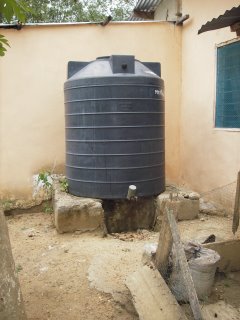
Then there are polytanks – from which we get bath water, wash water, etc. To fill the polytanks, though, you may need to stand 1 or 2 days on the roadside in order to stop a water truck, which will come to your place to fill your polytank. Polytanks are expensive, though – so not everyone has one, which means that people who do have o
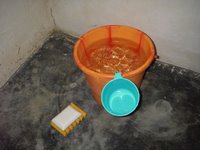 ne usually have the water for themselves as well as for a business - they sell it by the bucket to those who don’t have their own polytanks. Depending upon the season, the price of a bucket of water can be quite high and for refugees.
ne usually have the water for themselves as well as for a business - they sell it by the bucket to those who don’t have their own polytanks. Depending upon the season, the price of a bucket of water can be quite high and for refugees.A bucket can cost a bit of money on the camp – 10 to 50 cents, or 1 to 2 meals – so m
 any people don’t get the chance to shower, or wash their clothes, as often as they would like – and in this climate, it can be unfortunate for them – leading to skin problems, infections, etc. – and unfortunate for those around them, because deodorant is even more expensive than the water, so the lack of the two can picture of a water truck filling a tank have powerful results.
any people don’t get the chance to shower, or wash their clothes, as often as they would like – and in this climate, it can be unfortunate for them – leading to skin problems, infections, etc. – and unfortunate for those around them, because deodorant is even more expensive than the water, so the lack of the two can picture of a water truck filling a tank have powerful results.I have a polytank (pictured above), and after filling it with water it’ll last me
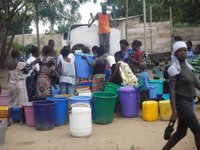 about a month. After the water truck finishes filling my polytank, there is always extra water – so my neighbors come
about a month. After the water truck finishes filling my polytank, there is always extra water – so my neighbors come 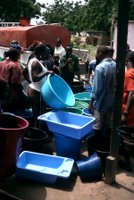 with their buckets. I have someone who helps me to stop the water truck and then arrange the filling of the tank and even distribution of the truck’s leftover water. And the distribution used to be chaos – I wasn’t often home, but once or twice I was and there’d be screaming, pushing, shoving, etc. Not a nice scene. A visitor was here with me for one of these occasions and advised the guy helping me to take control, organize the people and the buckets.
with their buckets. I have someone who helps me to stop the water truck and then arrange the filling of the tank and even distribution of the truck’s leftover water. And the distribution used to be chaos – I wasn’t often home, but once or twice I was and there’d be screaming, pushing, shoving, etc. Not a nice scene. A visitor was here with me for one of these occasions and advised the guy helping me to take control, organize the people and the buckets.
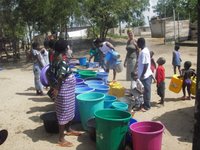
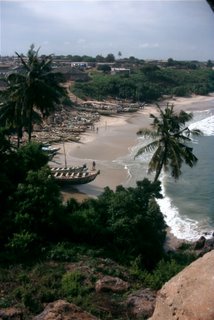
There’s also the sea. Wonderful for relaxing and restoring my sanity. Also good for fishing. Not so good to meet the basic water needs of the people on the camp, though.
And there’s rain. But not always – it depends on the season, but there are surprise showers throughout the year. The rain is free water – and it’s exciting. From the distance we can watch it come marching in, preceded by, and then accompanying, the winds that sometime
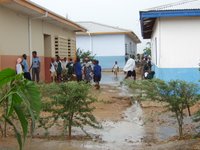 s whip off roofs, and then the water pounds down, creating raging streams that wash away most things that get in the way – plastic water bags, trash, shoes (if you’re not careful), soil (leading to some serious erosion problems), and occasionally even people get washed away. People rush to bring their buckets to catch the free water from any roof creating a waterfall. All other activity comes to a halt. And there’s perfect understanding for lateness and missed appointments. If you’re at school – the kids go wild – the rain alone is enough of a distraction, but the pounding on the tin roofs makes it impossible to continue lessons.
s whip off roofs, and then the water pounds down, creating raging streams that wash away most things that get in the way – plastic water bags, trash, shoes (if you’re not careful), soil (leading to some serious erosion problems), and occasionally even people get washed away. People rush to bring their buckets to catch the free water from any roof creating a waterfall. All other activity comes to a halt. And there’s perfect understanding for lateness and missed appointments. If you’re at school – the kids go wild – the rain alone is enough of a distraction, but the pounding on the tin roofs makes it impossible to continue lessons.And finally, snow – but only if you’ve experienced it in your life and have good memories and sweet dreams.


0 Comments:
Post a Comment
<< Home